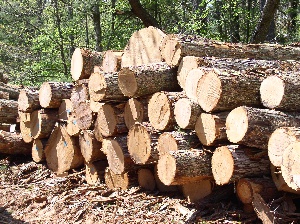The General Secretary of the Timber and Woodworkers Union on the Trades Union Congress (TUC), Joshua Ansah, has warned that the projected 50 percent increase in tree stumpage by the Forestry Commission by the end of this year will not augur well for actors in the timber business.
Addressing journalists in Accra, he said the decision from the industry regulator if carried out -- in the wake of continued decline in the price of wood products -- will throw about 30,000 workers out of business because the industry cannot absorb the rate.
Stumpage is the commercial timber value of a tree as it stands in the forest; this value can either rise or fall due to prevailing market forces at a specific time. Stumpage is charged per cubic metre volume according to the type of tree species.
“The Forestry Commission, which is mandated by law to review stumpage, has planned a second wave of increase by the end of this year; but this will not be in the interest of workers in the industry.
“The Commission has not reviewed the fee in the last eight years due to the fall in the price of wood products; however, the announcement of new stumpage rates which range from GH¢10 to GH¢150 per cubic metre to take effect by the end year will throw about 30,000 workers out of a job.
“This will happen because the industry cannot absorb the rate; the timber industry is going through challenging times and the only option is for the regulator to shelve the proposed increase. There are currently only about thirty timber firms still functional -- and barely meet their overhead cost; implying that any additional cost to production will only lead to job-losses,” he said.
Mr. Ansah said industry players are not against the proposed increase in stumpage in principle, but are rather seeking that it be shelved for now, in the wake of recent hikes in utility tariffs, to save the thousands of businesses and those that depend on them.
“With the recent adjustment in electricity tariffs, how can the already-struggling timber firms in the country sustain their operations in the midst of these daunting challenges? The issue is that if these jobs are lost, the country will have to rely on foreign/imported woodlots for wood products.
“Also, if stumpage remains high companies will be forced to harvest only high value species for export and the local market will suffer; the situation may also encourage illegal logging. “The future of the timber industry is bleak; we must act against the overreliance on oil and other mineral resources for foreign exchange earnings, because selective logging also holds better prospects.”
The Chief Executive Officer of the Ghana Timber Millers Organisation, Dr. Kwame Asamoah Adam, earlier this month lamented the loss of over 70,000 jobs in the sector over the last ten years -- and the drop in revenue from €200 million to €120 million annually, due to unfavorable economic conditions.
Business News of Thursday, 9 October 2014
Source: B&FT

















